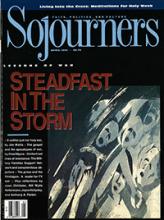Then I turned my face to the Lord God, seeking God by prayer and supplications with fasting and sackcloth and ashes ... To us, O Lord, belongs confusion of face, to our kings, to our princes, and to our fathers, because we have sinned against thee ... O my God, incline thy ear and hear; open thy eyes and behold our desolations, and the city which is called by thy name; for we do not present our supplications before thee on the ground of our righteousness, but on the ground of thy great mercy. -- Daniel 9:3, 8, 18
Where there is no vision the people perish ... -- Proverbs 29:18
These two passages of Scripture from the Old Testament have repeatedly intruded into my thoughts on what a proper black response should be to the war in the Persian Gulf.
I am not a Middle East expert. Nor am I a longtime civil rights activist who came of age fighting discrimination during the hurly-burly of the 1960s and early 1970s. I have only the vaguest memories of Vietnam POWs returning home at that war's end. A child of integration, I learned at an early age of Martin Luther King Jr.'s dream and came of age during Ronald Reagan's presidency.
Heading into this last turbulent decade of the 20th century, I am beginning to feel some kinship with my elders who, when they were my age, stood on the threshold of history. However, lest we stumble looking back at the past, I humbly urge both current black leaders and members of my generation to reinspect our dream and see it for what it has become.
The war in the Persian Gulf is a major crisis among many crises for black people and must be placed in the wider context of blacks in the United States. Leadership and vision are the common denominators linking the fortunes of blacks fighting in the Persian Gulf and those fighting for social justice here at home.
Read the Full Article

